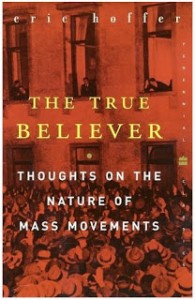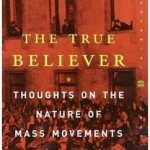Author: Eric Hoffer
Copyright: 1951
Copy: A great friend of mine from college gave me a copy.
 Gist: I can’t write about this book without mentioning how amazing the author is. Here is a link to Eric Hoffer’s wikipedia page. Basically, at the age of 5 while his mother is holding him falls down a flight of stairs and he loses his eye sight. He had already learned how to read and write in enligsh and german and then at the age of 15 his sight miracilously returns. Afraid he may loose his sight again, Hoffer consumes every book he can get his hands on. He specifically works jobs near great libraries so he can spend is free time reading the best books. Truly an amazing story. Suck it Good Will Hunting – you never had to go blind!
Gist: I can’t write about this book without mentioning how amazing the author is. Here is a link to Eric Hoffer’s wikipedia page. Basically, at the age of 5 while his mother is holding him falls down a flight of stairs and he loses his eye sight. He had already learned how to read and write in enligsh and german and then at the age of 15 his sight miracilously returns. Afraid he may loose his sight again, Hoffer consumes every book he can get his hands on. He specifically works jobs near great libraries so he can spend is free time reading the best books. Truly an amazing story. Suck it Good Will Hunting – you never had to go blind!
One of the results of his endless reading, Hoffer put together this piece called The True Believer. The book basically describes mass movements whether they be religious, political, violent, or not. Most of the discussion drills down to the indivudal true believer and what makes that person tick.
My Thoughts: To be honest I think this book is amazing and terribly underrated. First off, the guy wrote this in 1951 before anyone had any reference to 9/11 or Islamic extremism. It is amazing to see how applicable these concepts still are given he wrote them without any context of Iraq, 9/11, Munich, Afghanistan, or any number of contemporary scenarios that exemplify modern extremism. This guy was so ahead of his time with this text.
I think the whole book is worth reading and since it’s a short 168 pages it is not too arduous to plow through. I find myself returning to it now and again to remind myself of some of his concepts. There are far too many golden nuggest in this piece to narrow it down to key points or the most important pieces. So, I’ve just chosen three that I think are pretty interesting that I’d like to ramble on about tonight: 1) Fear of loss 2) How to stop a mass movement 3) Boredom.
Fear of Loss
In a previous post I spoke about the idea of “fear of loss.” Go and check that section out before you continue with this part because the following will make a bit more sense if you do. Hoffer on page 9 brings up a comparison between a radical and a conservative. Before this part, Hoffer states that radicals seeking revolution are looking for immediate and drastic change. So, the biggest difference between a conservative and a radical, in Hoffers explaniation, is “their attitude toward the future. Fear of the future causes us to lean against and cling to the present, while faith in the future renders us receptive to change.” I find this portion super interesting. Take todays political events (today being 3/21/2010). There are a large number of people who are very upset with President Obama’s health care reform and that his policy will likely be made into law due to it passing congress today. I make no comment to the value of the reform, make no assumptions. I simply point out that there are many parties HEAVILY invested in the current health care structure that stand to lose a great deal due to this radical change in U.S. health care. Those who stand to lose the most “fear the future” and are trying to cling to the present in order to maintain their current status. However, those who do not fear this future are eagerly supporting this change. Many slanderous terms have been thrown at those seeking change – to include radical. A fitting example given todays events, I think. There are a number of other examples I could point out but I will satisfy myself with that one. Leave a comment if you want others.
How to Stop a Mass Movement
Hoffer suggests that all mass movements whether they be political, religious, or what have you, are interchangeable. Meaning, they are fluid and capable of morphing into a different type of movement – religious to political, violent to non-violent. That being said, Hoffer suggests that the best way to stop a mass movement is to substitute one movement for another. I think this idea should be discussed at length with current policy makers. Far too often the issue of international tension or conflict is addressed directly. The conflict itself is addressed as opposed to the underlying issue that casuses the frustration that leads to the conflict. So if I understand this right, the best way to address international terrorism is to shift the focus to something else? Redirect hostilities? I could buy that, maybe. I think that would only work if the tension/conflict/energies were directed into something productive and peaceful vice negative or conflict producing and actually addressed the underlying issues. Hoffer clarifies more when he says, “any arrangement which either discourages atomistic individualism or facilitates self-forgetting or offers chances for action and new beginnings tends to counteract the rise and spread of mass movements.” I think this idea could possibly work as long as the “substitute” is one that offers peaceful results and a productive alternative.
Boredom
This is a subject that I plan to write more about later when I write about Blaise Pascal’s text Pensee. We’ll talk about it a bit here and then lots more in a few weeks. Hoffer suggests that on the individual level, those who join mass movements “crave to dissolve their spoiled, meaningless selves in some soule-stirring spectacular communal undertaking – hence their proclivity for united action.” Basically, those who find themselves caught up in extreme mass movements are often trying to find meaning to their otherwise meaningless lives. He goes on to say, “There is no more reliable indicator of a society’s ripeness for a mass movement than the prevalence of unrelieved boredom.” There is no possible way any Hitler, Usama bin Laden, Pol-Pot, Mao, Stalin, or any other mass movement leader could take the time to think up, organize, and execute a mass movement UNLESS they otherwise found no meaning to their life and also found themselves so idle that they were bored with their existence.” I don’t know about you, but I got a 9-5 job and I don’t have time to think up that kind of crap. “The differentiated individual is free of boredom only when he is engaged either in creative work or some absorbing occupation or when he is wholly engrossed in the struggle for existence.” I could go on and on with great quotes from Hoffer on this subject. I believe there is a lot to this concept which may seem simple at first glance, but in essence is extremely complex and applicable to a number of scenarios. Most extremists are bored either with their conditions or with themselves in general. They seek the great revolutionary change that mass movements promise that they hope will provide their lives with meaing.
Comments: Again, I found myself writing more than I intended and I worry that I may bore readers. In the end I don’t think I mind because I found the writing of it theraputic and think I may have done this more for myself than any reader – I know, I’m selfish. But it’s true, I find these posts to be satisfying and in the end if anyone reads this and finds them enlightening or helpful that only doubles my sense of satisfaction. So, please let me know what you may or may not have found interesting.







Leave a reply